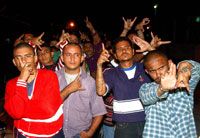By Chuck Remsberg
Police1 Senior Contributor
In Part 1 of this special Police1 interview with Frank “Paco” Marcell, jail intelligence supervisor for the Maricopa Co. (AZ) SO, advisor to the International Latino Gang Investigators Assn. and an executive board member of the National Major Gang Task Force, Marcell shared insight into the mind-set of “career” criminals, a savvy and violent group of offenders that poses a serious threat to officers.
In Part 2, Marcell shares suggestions on how you-and law enforcement in general--can prepare to confront career criminals and win.
 |
You say law enforcement needs to change in order to win against today’s career criminal. What needs to happen?
For one thing, we need changes in law enforcement training. Academies today are so pressured to teach such a high volume of material that I think they often ignore-or at least slight-important reality training.
Before young officers hit the street, they need to know what the criminal environment is like, in realistic terms. They need to know about the career-offender mentality. They need to know about prison-gang and street-gang threats that unfortunately are sometimes still officially denied.
We also need to re-examine whether officers are being provided with realistic training in firearms and defensive tactics. So few seem to have access to modern, advanced techniques. If we want to reduce officer casualties, I think we need more emphasis on the front end (how we prepare officers to face the practicalities of the street) instead of the back end (what happened that they got themselves killed).
 |
We need greater emphasis on intelligence gathering and, very important, intelligence sharing. Intelligence is key. Too often we’re on the outside looking in. We have to be on the inside looking in. These guys operate behind a veil. We need to penetrate that veil.
Career criminals need to be carefully monitored, even when they’re incarcerated at the local-jail level. Their criminal activity doesn’t stop with their arrest. By developing a full range of intelligence coverage, from monitoring phone calls to cultivating informants, the special intelligence unit at our jail has been able to detect and prevent or stop a great deal of major criminal activity, both inside and on the street.
We have information going back and forth all the time between us and detectives who are working robberies, homicides, drug cases. Intelligence needs to be shared. If one of these guys is coming our way, we want to know everything the police can tell us about him. If he’s coming out, back to the street, we should be sharing what we know with the cops who are likely to encounter him there.
As a police officer, you need to know who these individuals are and where they are. Because when they hit your area, it won’t take long before they’ll be responsible for a great deal of criminal activity.
Also if you happen to meet them on a domestic call, say, or on a traffic stop, you’ll be in a much better position if you have prior warning about them.
What can patrol officers do to protect themselves when they encounter career-criminals, especially if they’re not immediately aware of who they’re dealing with?
In approaching any subject, use your sensory perceptions greatly. What are my eyes telling me? What are my ears telling me? What is my gut telling me? A high state of alertness is essential. Stay in “the now,” don’t tune out. Because when they go for weapons, its fast.
Sometimes jargon may give away that they have a prison history. Or tattoos that are typical of inmates-crude, sketchy, usually only dark blue ink, in contrast to more colorful, more artistic street tatts. But not all career criminals are tattooed.
Your “presence” is important. There are certain things they respect: Clear, precise commands…a posture that looks like you can take care of yourself. The aura you project may make them more hesitant to be confrontational.
In Verbal Judo, George Thompson hits it right on the head: You want to be assertive vs. aggressive. They understand assertive. It’s not being overbearing, but decisive-looking and acting like you can take control of the situation.
Don’t be thrown off by their demeanor. If they haven’t made up their mind to take you on, no matter what, chances are they’ll be reading you and trying to manipulate you. Do you sense an overfriendliness? That’s a common cue.
So is flip-flopping. They may be smooth talking and manipulative in one instant and verbally abusive the next. A favorite intimidation tactic is the “stare down,” to see if you’ll break eye contact. If so, it’s seen as a sign of weakness.
They may test you to see what reaction they can provoke, how much they can get away with. Regardless of their tactics, you need to be aware of their games and inform them that you won’t tolerate them.
 |
People unfamiliar with the career-criminal subculture tend to underestimate these people. But even though they often do poorly in structured educational settings, they are not stupid or slow. They’re cunning. They put an enormous amount of effort into their criminal lifestyle, studying and training to improve their crime-related skills.
Remember that every contact is a potential career-criminal contact. These guys are highly transient. They go where opportunity is. They may have done time with someone from another part of the country who has a racket going and they may just cross your path on their way there, wherever you happen to work. No place, no officer is immune.
Thanks to Chief Jeff Chudwin of the Illinois Tactical Officers Assn. and Lt. Col. Dave Grossman for motivating this article.
[For more insights into effective contact tactics, see the Police1 article, The Gang Stop: Safer and more efficient field interviews by Sgt. Lou Savelli, NYPD (ret.).]
[The National Major Gang Task Force will offer more information on career criminals, security threat groups, and street gangs at its 12th annual conference Sept. 11-13 in Indianapolis. Topics will include gangs on the street and in prison, intelligence gathering, gang tattoos, terrorism and corrections, interview techniques, officer safety, STG management, school security and more. For details phone 317-322-0537 or email nmgtf@earthlink.net. The conference is cohosted by the Indiana DOC, Indiana State Police, Indianapolis PD, and the Marion County (IN) SD.
[Intensive content on prison gangs, street gangs and terrorist organizations that are infiltrating our correctional facilities will also be featured in the 1st nationwide training conference held by the California Gang Task Force Nov. 13-15 in San Diego. For more information contact Marriam Lumbang, 916-631-0178.]


